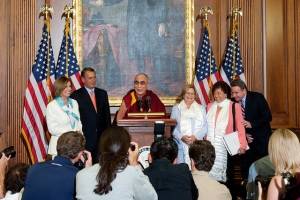Support migrant centric journalism today and donate

 • Watch This Video
• Watch This VideoThe United States Senate voted 49-48 this morning to place a five-year limit on a program that would have provided U.S. employers with 200,000 temporary foreign workers annually. The amendment was introduced by Senator Byron Dorgan of North Dakota.
A Senate vote just two weeks ago rejected the "five-year" amendment by Dorgan, who believes that immigration takes jobs that Americans could fill.
"There are a lot of people here who want jobs and can't find jobs, and find downward pressure on their incomes," Dorgan said."
The reversal on Thursday morning dismayed some backers of the immigration bill which, so far, has the support of Goerge Bush. The bill is vehemently denounced by many conservatives, but there are also portions of the bill opposed by more liberal interests.
Business interests vs. family interests
Businesses and many of those allied with them in Congress were already angry that the bill cut the number of annually allowed temporary foreign workers from 400,000.
They claim that the amendment to end the program after five years may break the back of the fragile bipartisan coalition aligned with the White House. Rhetoric has been thick on both sides of the debate, with a number of interests pointing to specific proposals and amendments and characterizing them as "deal-breakers."
According to Senator Arlen Specter from Pennsylvania, the Dorgan amendment "is a tremendous problem, but it's correctable." The coalition will try to persuade at least one senator to help reverse the outcome yet again, he said.
The so-called "grand bargain" was enjoying a good day until the Dorgan votes were tallied.
The coalition had successfully turned back a bid to reduce the number of illegal immigrants who could gain lawful status and defeated an effort to postpone the bill's shift to an emphasis on education and skill levels among applicants, rather than family connections.
Traditionally, U.S. immigration policies have strongly favored the reunification of families. One of the fundamental changes being proposed in the current immigration reform debate is being more neutral toward family relations when considering immigrant applications. More importance will be given to immigrants with needed skills to boost American productivity and competition in the global economy, a trend that has been gathering popularity with a number of countries in recent years.
The bipartisan coalition also fended off an amendment by a Democratic presidential contender, Senator Barack Obama from Illinois. It would have ended a new (for the U.S.) points-based system for those seeking permanent resident "green cards" after five years, rather than fourteen years.
The three amendments were seen as potentially fatal to the bill, which increases border control, raises penalties for those who employ illegal immigrants, and gives the estimated 12 million illegal immigrants a route toward legal status.
Other developments
The Dorgan amendment was not the only blow for the bill's advocates. They failed to defeat a Republican proposal to give law enforcement agents access to rejected visa applications, which could aid in the arrest and deportation of some illegal immigrants who might otherwise escape detection.
The coalition also failed to block a provision by Senator James Inhofe of Oklahoma that would make English the national language. Critics and opponents believe the measure is irrelevant to immigration reform and demeaning. It is generally thought that there will be significant attempts to kill the amendment during House and Senate negotiations.
However, the coalition stressed that it was a good day and felt that if the Dorgan amendment can be overturned, the bill would be in good shape.
Yesterday an amendment by Senator John Cornyn was defeated that would have violated the basic rights of immigrants by denying them court proceedings under certain circumstances. It also granted unchecked powers to the government to deport people using secret evidence.
Instead, an amendment by Senator Edward Kennedy was passed. It still allows certain crimes committed by people to disqualify them from becoming citizens, but it sets a far more reasonable standard of which crimes are serious enough for such a penalty.
It also does not deny immigrants a path in court to contest determinations and makes no attempt to grant the federal government surveillance and deportation powers based upon "secret evidence."
Debate remains heated, with a vote intended for this month. No date has been set yet. If the bill survives the Senate, it will be debated in the House of Representatives next, then the Senate and the House will attempt to reach a compromise.
Upon a reaching a bill that both houses of Congress agree upon, the bill will then go to the White House to be vetoed by the president or signed into law. Most analysts agree that the new law needs to be passed by the end of September, or else the entire reform effort will likely be derailed until after the next presidential election in November, 2008.
Related:
• Key proposals in US Senate immigration reform debate• Spotlight - immigration reform in the United States
• US still trying to reform immigration system
• The US Congress will begin immigration reform, again
• US Senate reviews immigration reform
• US business gears up for immigration-reform fray
• Bush serious about immigration reform
• US Senate announces proposal on immigration overhaul legislation
• US immigration faces crisis
• US study concludes immigration does not threaten English language





















